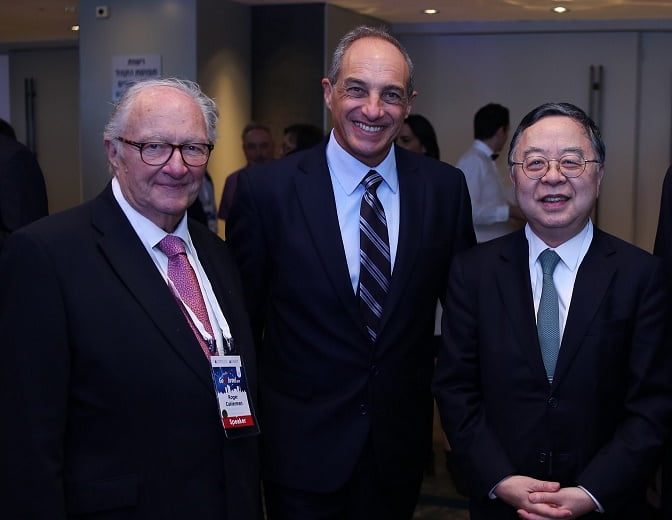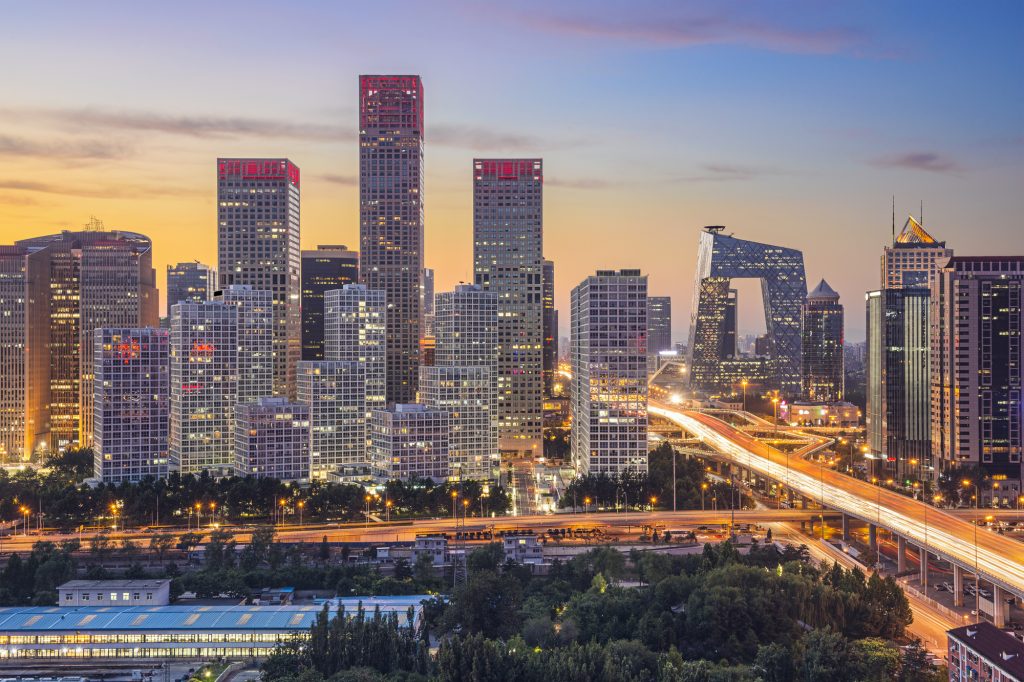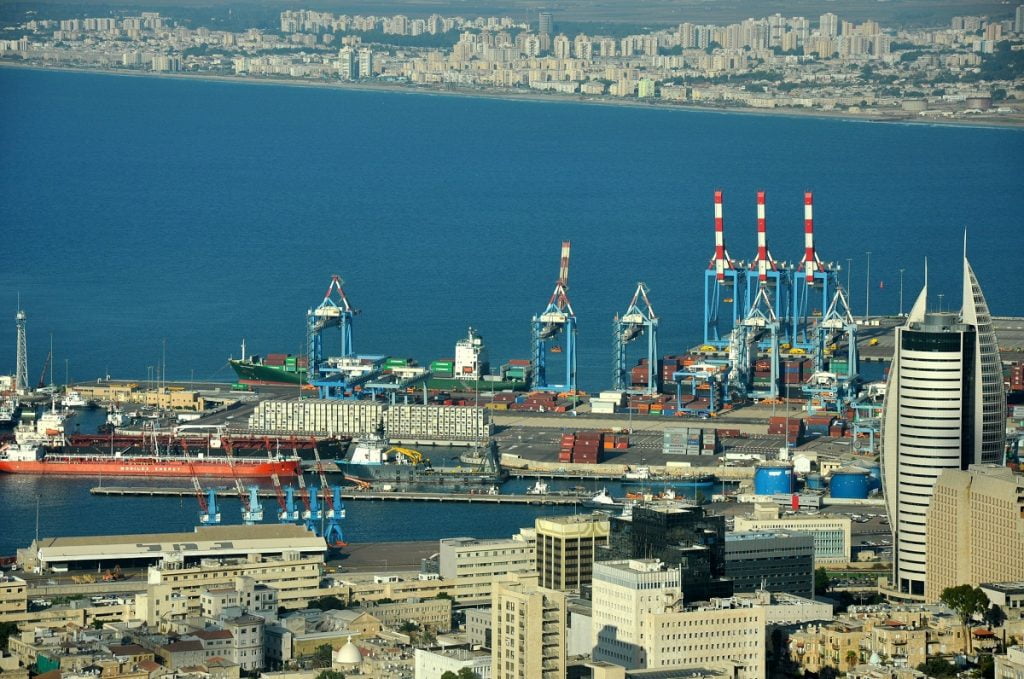Over 700 participants from across the world, including 100 from China, converged in Tel Aviv this week for the 2019 GoforIsrael conference, a business summit that brings together global investors, business leaders, and entrepreneurs for investment and collaboration opportunities in Israel.
“In light of the significant changes in the global economy, Israel’s position in the world investment map is strengthening,” said French-Israeli businessman Edouard Cukierman ahead of the event. Cukierman is the chairman of Cukierman & Co Investment House and the co-founder of Catalyst CEL Funds, the co-organizers of the conference.
SEE ALSO: Over 100 Israeli Companies Take Part In Annual Investor Conference In China
“While economic stability in other regions of the world is diminishing, Israel remains a stable and safe investment for the time being, with a diverse and impressive supply of breakthrough technology startups,” he added.
The conference featured panel discussions on opportunities for Israeli companies in China, investments in Israeli life science firms, and two-minute elevator pitches from Israeli startups and companies in medical technology, software, mobility, and robotics.

Speaking at the conference at the Hilton Hotel in Tel Aviv on Monday, Cukierman said Israel was a “global center of venture capital” and a country that “produces numerous unicorns [companies valued at over $1 billion] and has the second-largest [venture capital concentration] after the United States with record-breaking capital raising.” Over the course of 2019, Israeli startups and companies raised some $6.5 billion, he said, a sum that is second only to the US.
Cukierman also thanked Hong Kong billionaire businessman Ronnie Chan, who chaired the GoforIsrael conference, for being a “loyal partner in Israel-China innovation.” Chan is chairman of Hang Lung Properties, one of China’s biggest real-estate firms, and the co-founder of philanthropy foundation Morningside which focuses on technology and education in China, Israel, and the US.

Addressing the audience in his closing remarks at the conference, Chan urged Israeli entrepreneurs and investors to closely study the markets and products offered in China, urging them not to underestimate the Asian powerhouse’s technological capabilities as companies based there continue to innovate and grow.
“Looking at US tech giants like Facebook, Google, and others, they use very large amounts of engineers for development purposes. In contrast, when you look at the Chinese giants like Alibaba, Baidu, Tencent, everyone there acts like they are still entrepreneurs. Many are still working 24/7 and sleeping in the office,” Chan said.
A balancing act
The conference comes amid an escalating trade war between China and the US, and increased political tensions between the world’s two largest economies. Washington and other Western capitals have accused Beijing of IP theft, currency manipulation, and large-scale espionage activities via business and commercial ties.
And while Israel considers the US its most important ally, Israeli entrepreneurs are increasingly eyeing the huge potential in Chinese markets and seeking inroads.
Chinese-Israel government relations have been strengthening for years and business activity is also buzzing. China is Israel’s largest trade partner in Asia and its third-largest global trading partner, with mutual trade estimated at $14 billion in 2018.
“Israel is a small country and it is very dependent on foreign trade. So whatever disrupts foreign trade, in the world, is bad for Israel,” explained Dan Catarivas, the director-general of Foreign Trade and International Relations at the Manufacturers’ Association of Israel, at a press briefing hosted by the Israel-Asia Center in Jerusalem last month.
“For Israeli businessmen, the world is their market because the market in Israel is very small, so most companies look at the global market from the very beginning,” said Catarivas, who is also an Israel-Asia Center Advisory Council member. “It’s obvious that China is a major player in the world economy and it is a country that has to be taken into consideration and there are opportunities so why not take them.”

At the same time, he says, “the business horizon for Israeli companies in China is very limited.” Citing 2018 figures, Catarivas said that 65 percent of Israeli exports to China, valued at $4.6 billion, were Intel semiconductor chips and Israel Chemical products.
“There wasn’t much else,” he noted explaining that an entry for Israeli companies into China is very difficult. There are some success stories but you hear more about the failures.
“The big potential in trade to China of Israeli products is relatively limited. Other countries have more potential there. We have stories of Israeli companies going into the Chinese market and after five years, their product is totally copied,” and they are effectively pushed out, said Catarivas.
On the other hand, “the majority of investors in Israel are still not Chinese,” he said, even as China takes a keen interest in Israeli innovation.
Another area is infrastructure, Catarivas explained.
Chinese firms are heavily involved in major infrastructure and transportation projects in Israel, including the new Ashdod and Haifa ports. At least five Chinese firms are set to submit bids to build a key section of the Tel Aviv light rail system.

American officials have already repeatedly expressed concerns with tightening economic ties between Israel and China and have issued warnings over the increasing involvement of Chinese firms in Israeli infrastructure. A report issued by the Rand corporation earlier this year warned that such involvement may become a security risk for both Israel and the US.
Under increased pressure from Washington, Israel’s security cabinet in October decided to set up a ministerial advisory committee to monitor Chinese investments in Israel, a move Israeli officials have resisted for years. “Regulators will consult with the committee voluntarily; business transactions that do not require government approval will not be brought before it,” Haaretz reported at the time.
Due to these complexities and because of a lack of real clarity in American policy, Catarivas said, Israeli companies “have to be careful because you have more and more incompatibility of working with China and with America [at the same time]. Some companies will find it incompatible to have Chinese investors if their major market is the American market.”
Sign up for our free weekly newsletter
SubscribeCatarivas said that Israeli companies, and especially startups looking for capital, will have to make up their minds. “Either they go for the big market, or go for America, which I would think would qualify as going for quality instead of quantity. Although, China is also becoming ‘quality.'”
“When we advise companies, we say ‘be careful, analyze and see, and you might want Chinese investors, but you must understand that that might limit you in your future activities in America,'” he explained.

Zvi Shalgo, chairman and owner of the PTL Group, an organization that provides business services and administrative and operational support for foreign companies in China, tells NoCamels that, in effect, the establishment of the foreign investment committee did not signal a big change.
“Restrictions on investments in certain industries, like the military tech sector, already exist. The way the Israeli government handled this was correct; it was low-key, it was careful and respectful and it didn’t make a lot of noise,” Shalgo says.
Israel and China have a strong relationship, and there is “no reason not to have ties with the biggest economy in the world. Israel is a sovereign country and has its own interests,” he says, adding that the move will hopefully satisfy the Americans while keeping ties with the Chinese in place.
Haggai Ravid, CEO of Cukierman & Co Investment House, tells NoCamels that it’s too early to say if the formation of the committee will have any impact but that Israel is engaged in a balancing act.
SEE ALSO:This Industrial Chinese City Is Looking To Israel To Help Transform Into An Innovation Hub
He agrees that regulations are already in place to prevent Israel from selling sensitive military-related technology to China and other countries. “We’re all aware of what is allowed and not allowed. There is no need for more bureaucracy or government intervention,” Ravid tells NoCamels.
There are clear “limits to what we can do with China,” Catarivas said, citing the 1990s Phalcon deal where Israel had to scrap the sale of advanced airborne radar systems to China amid strong US opposition.
“Selling military tech is outside the bounds of the relations with China and the Chinese know this,” he went on. “But there’s a whole category called dual usage, where tech would have both civilian and military applications… and this area that was more easy to detect 20 years ago is becoming much more complicated because today almost everything can [have] dual use.”
Finding that line, he said, is a major challenge for many countries, not just for Israel.
Chinese interest in Israel
Chinese interest in Israel is vast and covers different sectors such as digital health, agriculture tech and food tech, AI, robotics, and autonomous vehicle tech, Ravid tells NoCamels. Tensions between Washington and Beijing have not slowed down this interest in Israeli innovations, he says.

The Chinese “do not hesitate to do business in Israel; they meet their needs. They are very practical and pragmatic. It’s all business,” Shalgo tells NoCamels.
The West has to be pragmatic too, Shalgo warns, because “if the medium of war is economic, China is completely prepared and it will win.”
“There is no room for complaints. In China, government and business go together and this pushed the country toward unbelievable achievement and growth in recent years. This may not be fair but the West has failed to get organized and compete,” he charges.
The West has had “no mechanism to protect their companies or industries. Chinese companies are backed by the government and have access to money and resources, which makes them very competitive and aggressive.”
American policies toward China, says Shalgo, are “kind of hysterical and are trying to compensate for not doing anything against Chinese expansion for two decades.”
In the West, the mentality is for a free and open market. In China, government and business go hand in hand. “Why should they stop? It has worked very well for them,” Shalgo says.
Israel needs to care for its interests, said Catarivas. “We need better infrastructure as we are falling behind. The government has to maximize its budget and if it can get a better deal with a Chinese contractor than with an American one or an Italian one.. can anyone blame the Israeli government?”
At the same time, he warned, America is trying to build “a kind of alliance with other countries” against China and perhaps the Americans “feel a bit uncomfortable that Israel, a major ally, does not fall in line with stopping the so-called Chinese expansion.”
“So we have to understand the sensitivity of the Americans…but we have to balance it with our own national interests,” Catarivas said.
Related posts

Editors’ & Readers’ Choice: 10 Favorite NoCamels Articles

Forward Facing: What Does The Future Hold For Israeli High-Tech?

Impact Innovation: Israeli Startups That Could Shape Our Future




Facebook comments